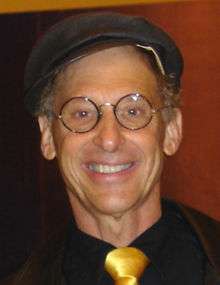Allan Snyder
Allan Whitenack Snyder is the director of the Centre for the Mind at the University of Sydney, Australia where he also holds the 150th Anniversary Chair of Science and the Mind. He is a co-founder of Emotiv Systems and winner of the International Australia Prize in 1997 and the Marconi Prize in 2001 for his contributions to optical physics.
Allan Whitenack Snyder | |
|---|---|
 | |
| Born | |
| Alma mater | University of London (DSc), University College London (PhD), Harvard (MS), Massachusetts Institute of Technology (SM), Pennsylvania State University (BS), Central High School Philadelphia (BA). |
| Awards | 1996 Harrie Massey Medal of the British Institutes of Physics, 1997 International Australia Prize, 2001 Marconi Prize, 2001 Clifford Paterson Prize, Royal Society |
| Scientific career | |
| Fields | Mind Sciences, Visual Neurobiology, Communications and Optical Physics |
| Institutions | Director, Centre for the Mind, University of Sydney |
Allan is also the Creator and Chairman of the What Makes a Champion? forum, an official Olympic cultural event first held at the Sydney 2000, then Beijing 2008 and forthcoming London 2012 Olympic Games. Nelson Mandela and John Howard opened the 2000 event. Tony Blair and Kevin Rudd opened the 2008 Beijing event.
Snyder's research career began in optical physics and he has published several important papers and books in this field . More recently, he has begun to work on mind sciences.
Snyder has appeared in several television programs demonstrating how transcranial magnetic stimulation to the left temporal lobe can induce savant-like skills in healthy people. For example, these studies show that after TMS, a person can draw better or count the number of dots on a screen very fast.[1]
Savant hypothesis
Snyder is interested in understanding savants, how the savant brain perceives and interprets the world, the neurological and subjective correlates of the savant brain, and how to activate or at least promote savant level brain functions in non-autistic, healthy individuals. Even something as simple as seeing, he explains, requires phenomenally complex information processing. When a person looks at an object, for example, the brain immediately estimates an object's distance by calculating the subtle differences between the two images on each retina (computers programmed to do this require extreme memory and speed). During the process of face recognition, the brain analyzes countless details, such as the texture of skin and the shape of the eyes, jawbone, and lips. The vast majority of people are simply unaware of these calculations due to the brains' information filtering processes. In savants, says Snyder, the top layer of mental processing —conceptual thinking, making logical deductions— is somehow deactivated. His working hypothesis is that once this layer is inactivate, one can access a startling capacity for recalling the most minute detail or for performing lightning-quick calculations. Snyder's theory has a conclusion of its own: He believes it may be possible someday to create technologies that will allow any non-autistic person to access these abilities.
Awards
He won the Harrie Massey Medal and Prize in 1996.
In December 2001 he received the Marconi Prize in New York City.
He was elected a Fellow of the Royal Society of London in 1990 and is the recipient of their 2001 Clifford Paterson Prize.
Previously, he was a Guggenheim Fellow at Yale University’s School of Medicine and a Royal Society Research Fellow at the Physiology Laboratories of Cambridge University. He is a graduate of Harvard University, Massachusetts Institute of Technology and University College London.
Education
Snyder has a DSc from the University of London, a PhD from University College (1969), London, an MS from Harvard University (1967), an SM from Massachusetts Institute of Technology (1965) and a BS in Electrical Engineering from Pennsylvania State University (1963), University Park.
Centre for the Mind
The Centre for the Mind is the brainchild of Professor Allan Snyder FRS, and was launched at the historic Museum of Sydney on 4 August 1997. Dr Oliver Sacks, renowned author and neurobiologist, delivered the Foundation Lecture on "Creativity and the Mind" at the gala public opening on 5 August 1997. This event was held at the Australian Academy of Science where Dr Sacks received the Foundation Medal from the President of the Academy, Sir Gustav Nossal.
The Inaugural Centre for the Mind board members were:
- Professor Allan Snyder FRS (150th Anniversary Chair of Science and the Mind, University of Sydney)
- Professor Gavin Brown (Vice Chancellor, University of Sydney)
- Professor Peter Karmel (Vice Chancellor, Australian National University)
- Lachlan Murdoch (Executive Chairman, News Limited)
- Baz Luhrmann (Film Director)
Distinguished Medal recipients:
- Professor Daniel Dennett (Philosopher and Author)
- Professor Horace Barlow (Trinity College, Cambridge)
- Professor Vilayanur Ramachandran (University of California)
- Sir Richard Branson (Virgin Enterprises)
What they do
"We explore what it is to be uniquely human. We do this by investing in challenging research, by orchestrating spectacular intellectual events, and by acting as a global nexus for great minds. Our mind laboratories focus on scientific ways to enhance creativity and to instill the champion mindset." [2]
See also
- Champion mindset
References
- "PerceptionWeb Abstract". Archived from the original on 17 January 2010. Retrieved 28 May 2009.
- Centre for the Mind; Who We Are
External links
- University of Sydney
- Centre for the Mind
- What Makes a Champion?
- London Science Museum
- Marconi Foundation
- Is integer arithmetic fundamental to mental processing?: the mind's secret arithmetic.